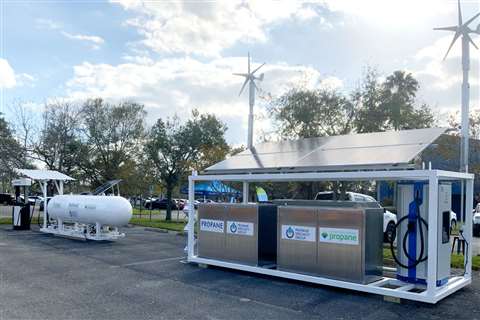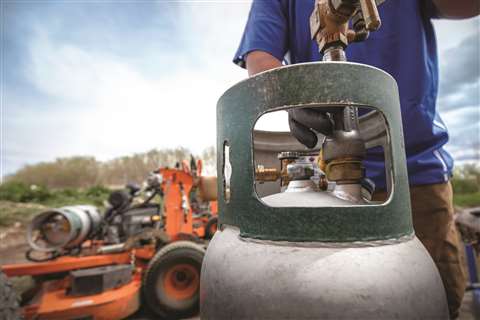Funding for propane refueling, recharging infrastructure
03 April 2023
 Propane fueling solutions infrastructure (Photo: Propane Education & Research Council)
Propane fueling solutions infrastructure (Photo: Propane Education & Research Council)
The Charging and Fueling Infrastructure Discretionary Grant Program (CFI Program) has released new details on funding for publicly accessible propane autogas refueling and recharging infrastructure to help communities and agencies reduce emissions.
The CFI Program will make $700 million in grants available to support the nation’s alternative fuel corridors, and agencies can apply for propane autogas refueling or propane-powered recharging solutions before 11:50 p.m. EST on Tuesday, May 30.
“The goal of this program is to rapidly improve access to alternative fuel options and ensure energy equity by doing so in areas that have been historically underserved,” said Steve Whaley, director of autogas business development with the Propane Education & Research Council (PERC). “The fastest and most-cost effective way to achieve that goal is by implementing propane autogas refueling and propane-powered recharging infrastructure. Both options are affordable, available, and can accelerate our nation’s decarbonization and clean-air efforts.”
Over five years, the CFI Program will award $2.5 billion by prioritizing rural areas and low-to-moderate-income communities.
 Photo: Propane & Education Research Council
Photo: Propane & Education Research Council
According to PERC, propane autogas is an ideal choice for medium-duty (Class 3-7) fleets with a range of up to 400 miles on a single refuel because the fuel’s performance allows vehicles to carry heavier payloads while lowering the total cost-of-ownership.
The cost of purchasing and installing propane autogas refueling equipment for such a fleet is a fraction of the price of fast-charger equipment for comparable electric vehicle fleets in a comparable time frame, PERC said.
Agencies can also maximize their investment by including several alternative fuel vehicles within the same infrastructure: For example, Propane Fueling Solutions has a portable dual-purpose standalone fueling system that can refuel propane autogas vehicles and recharge EV fleets with DC level-3 fast chargers by utilizing a microgrid powered by renewable energy sources.
According to PERC, the available propane infrastructure provides a resilient and affordable charging option independent of the grid, with order lead times taking weeks instead of months or years with other alternatives.
And because this infrastructure can be portable and installed in as little as 24 hours, these systems are approximately 75% less expensive compared to traditional EV-charging infrastructure because the propane autogas technology doesn’t require the same site prep or permanent housing.
“Whether agencies choose to implement propane autogas refueling stations or propane-powered recharging, the real winners here are the communities that benefit from the cleaner air,” Whaley said. “Today’s propane autogas engines reduce harmful nitrogen oxide (NOx) emissions by 94%, and propane-powered generators for light commercial microgrids are significantly cleaner than diesel with near-zero NOx and carbon monoxide emissions, as well as a 24% reduction in carbon dioxide emissions.”
Applications for CFI Program grant funding must be submitted electronically through Grants.gov.
STAY CONNECTED




Receive the information you need when you need it through our world-leading magazines, newsletters and daily briefings.
POWER SOURCING GUIDE
The trusted reference and buyer’s guide for 83 years
The original “desktop search engine,” guiding nearly 10,000 users in more than 90 countries it is the primary reference for specifications and details on all the components that go into engine systems.
Visit Now
CONNECT WITH THE TEAM










